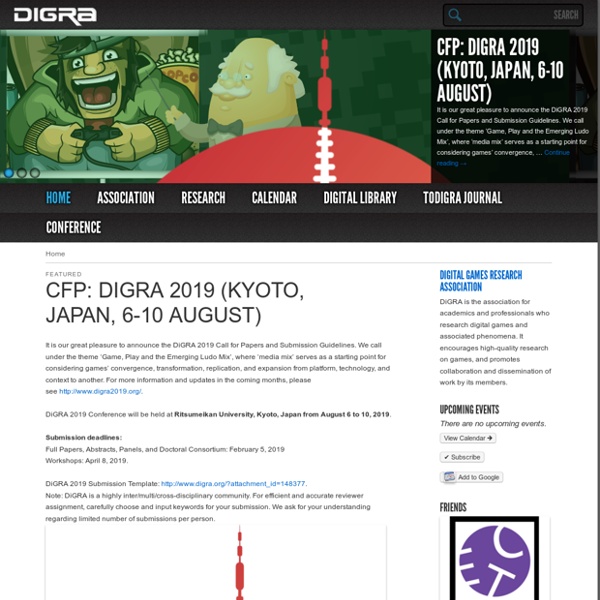Game Studies - Home
Welcome to the official site of the ICA Game Studies Division (GSD)! The study of games and the game experience offers opportunities for the study of human communication that involve multidisciplinary approaches that merge the disciplines of conventional communication studies and research, arts and visual design, cognitive studies, computer sciences, cultural studies, engineering social sciences, health sciences, and information design. Although the common ground for the Game Studies Division is digital and video games, the group encompasses a broad range of inquiry topics and methods.
Issue 1102, 2011
Interactivity, Inhabitation and Pragmatist Aesthetics by Phillip D. Deen Pragmatist philosophy of art provides an account of aesthetic experience particularly suited to the transactive and immersive qualities of video games and superior to spectatorial and institutional alternatives. It also distinguishes between mere emotion and artistic expression, providing a response to those who assert games cannot be aesthetic.
Video Games Industry Market Research - npd.com
Video Games Products Retail Tracking Monitor retail sales of PC games and video games hardware, software, and accessories in the US and Canada.
Game Studies 2015
Self-Reflexivity and Humor in Adventure Games by Krista Bonello Rutter Giappone This article focuses on the “adventure game” genre, its metafictional humor, and tendency towards self-parody in both its formative stage and its more recent ensuing nostalgic turn, with particular reference to Zork (Infocom, 1980), LucasArts’ Monkey Island games (1990-2000), and Telltale’s parodic-nostalgic “Reality 2.0” (Sam and Max, 2007).
Clues for a General Game Design Methodology
Nowadays, there is a big tendency to make configurable games. Games are increasly modular and extendable in order to stretch out the lifespan of the game itself (remember for how long people still played Doom or Quake?). Some examples are on First Person Shooters (Quake II, Unreal, Half-Life, ...), Wargames (Myth II, WarCraft 2, StarCraft, ...), MUDs (LPMUDs, ...) and even Board Games (Zillions of Games). This is logical, because many people found out that they do not only want to play the game, they also want to change it!
Home Page – The Big Game Hunter
All the latest NEWS, announcements, reports, events, calendar listings, new game releases and such sent to us from players, collectors, puzzle people, authors, editors, associations and game companies can be found by going to News in the Main Menu. Check the menu at the top and at the full menu on the left for new articles and updated information. We support spielbox, the magazine every game player and prospective game buyer should have! Spielbox, published in German for 30 years, now has an English-language edition. To go to their website, click on spielbox.de.
Bartle's Taxonomy of Player Types (And Why It Doesn't Apply to Everything)
Richard Bartle co-created MUD (Multi-User Dungeon), the text-based precursor to today's MMORPGs, while studying at Essex University. He ended up formulating the theory that all MUD players could be broken down into four main types: killers, achievers, explorers, and socializers. This theory has since been used in all sorts of game design situations where it doesn't apply - let's look at what exactly it does tell us.
Game Research - The art, business, and science of video games » Home
Gamasutra - The Art & Business of Making Games
Flow Theory
Flow theory was proposed by Mihalyi Csikszentmihalyi to describe the experiences of intrinsically motivated people, those who were engaged in an activity chosen for its own sake (Csikszentmihalyi, 1975, 1997). Such activities were viewed as worth doing just for the sake of doing them rather than as means to another end. While other research on intrinsic motivation focused on behavioral outcomes, Csikszentmihalyi attempted to describe the quality of subjective experience, or how intrinsic motivation felt. Further, he sought to explain the characteristics of activities that people were intrinsically motivated to pursue, and why such activities were rewarding. Under certain conditions, people's experiences are optimal.
The Entertainment Software Association - Home Page
The Ludologist
These are some comments from my keynote at Rutger’s Extending Play conference in 2016, co-presenting with Shaka McGlotten. Hasn’t our sense of play suddenly become quite dark? There is a change in our primary conceptions of playing, and game-playing. In Brian Sutton-Smith’s Ambiguity of play, he lists 7 common rhetorics of play, meaning 7 common ways in which play is framed. When the field of game studies began, we probably used four quite positive rhetorics of play: Rhetoric of play as progress.Rhetoric of play as fate.Rhetoric of play as power.Rhetoric of play as identity.Rhetoric of play as the imaginary.Rhetoric of the self.Rhetoric of play as frivolous.
Persuasive Games
A book about how videogames make arguments: rhetoric, computing, politics, advertising, learning. Videogames are both an expressive medium and a persuasive medium; they represent how real and imagined systems work, and they invite players to interact with those systems and form judgments about them. In this innovative analysis, Ian Bogost examines the way videogames mount arguments and influence players.



